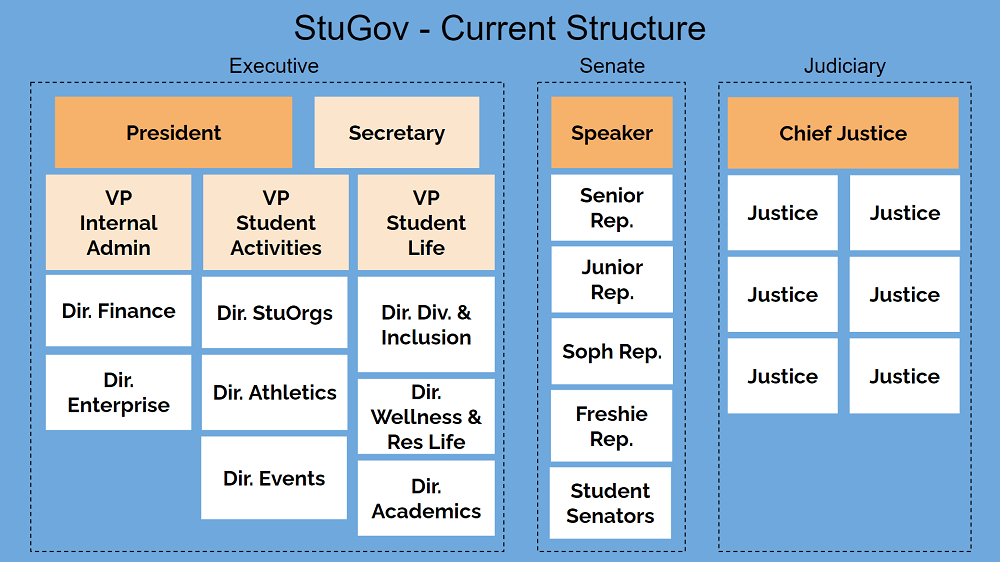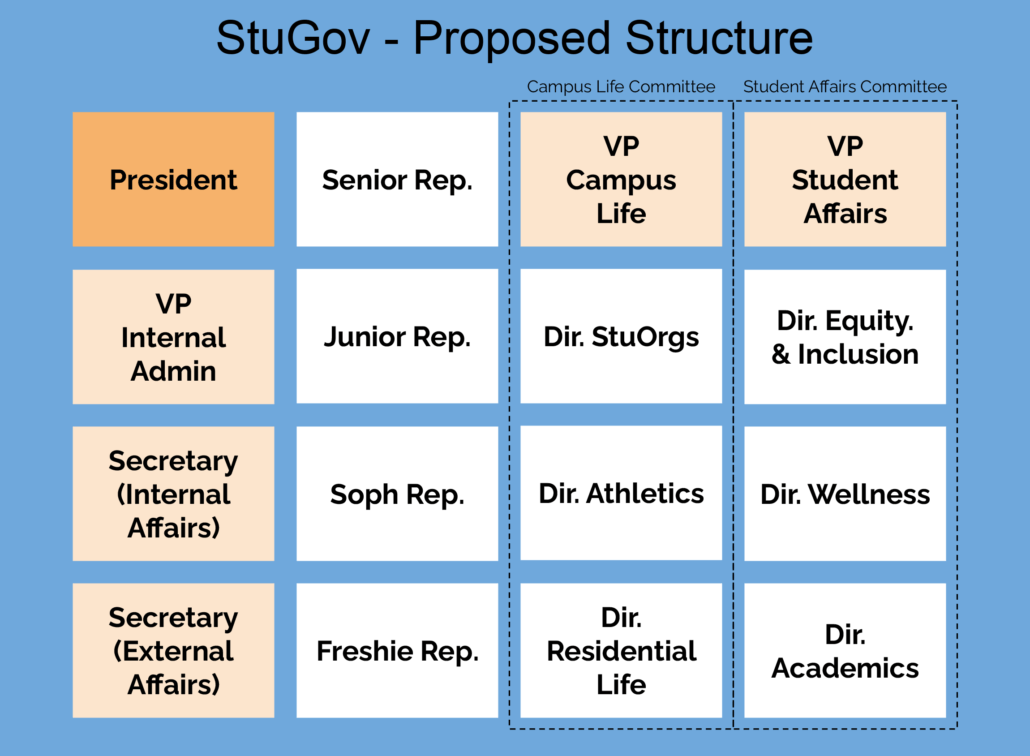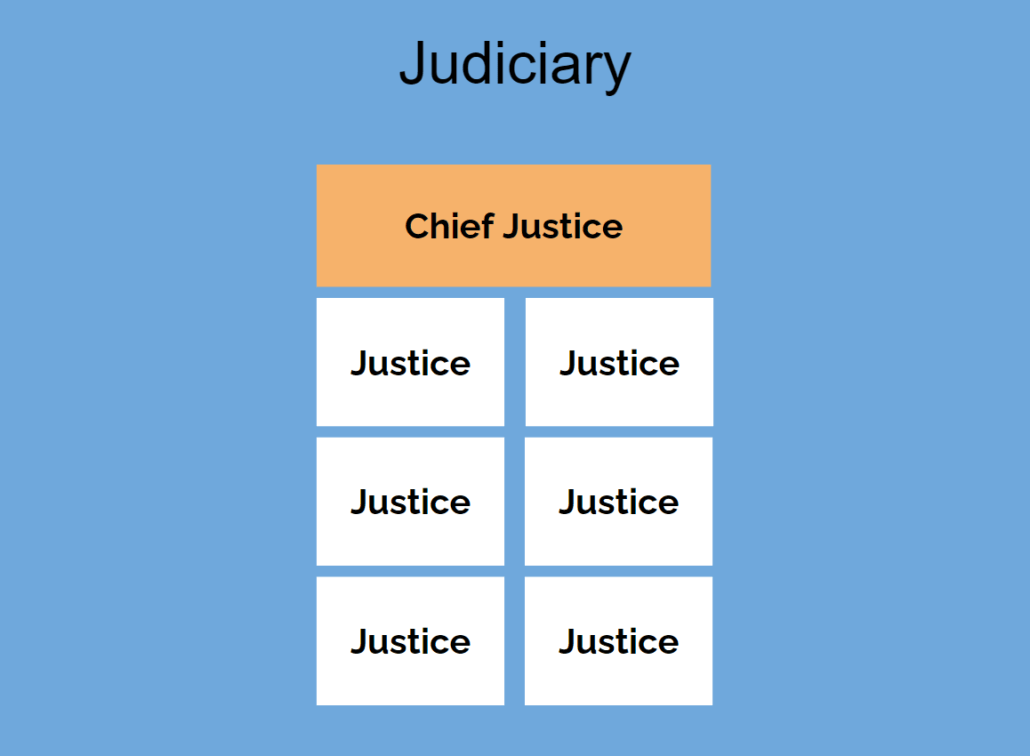Published 10 Mar 2021
Updated 17 Mar 2021 (Updated names of VP roles and added info on IRV)
StuGov Restructuring 2021
Over the past months, there has been a growing sentiment among StuGov members that the current StuGov structure is not working out. Members felt that the structure does not facilitate efficient work and communication, and does not provide for effective collaboration. Therefore, in January, we began developing a new structure that would help to solve existing issues. On this page, we present the underlying motivation as well as the proposed changes. The new structure is up for student review and input from Wed 10 Mar until Fri 19 Mar 2359hrs.
Background
Purpose of StuGov
Among members, the consensus is that StuGov’s role is advocacy and representation. Advocacy refers to advocating for student interests and pushing for policy changes by engaging with College staff/faculty. Representation refers to representing student views and providing input on behalf of students.
In order to fulfil these purposes, StuGov members listen to student sentiments and gather opinions on a wide variety of issues, conduct surveys, consolidate the input, craft proposals, attend regular and ad-hoc meetings with College staff/faculty, provide feedback on College policies, speak up on students’ behalf, and take any other forms of action to convince College staff/faculty to make decisions that align with (what members believe to be) student interests.

Issues with Current Structure
Current members identified numerous disadvantages:
- Too much bureaucracy and inefficiency arising from a large StuGov and complicated structure
- Separation of Executive and Senate members does not help as they inevitably have to collaborate together closely
- Unbalanced workload (between Executive and Senate/Judiciary, between StuGov members and Student Associates, and between ExCo and non-ExCo)
- Positions with narrowly-defined roles (e.g. Director of Finance) / non-advocacy roles (e.g. Director of Events)
- Inactive Judiciary due to poorly-defined scope
- Recurring vacancies both within StuGov (e.g. Directors/Class Reps) and within the Elections Committees
Principles of New Structure
Members suggested the following principles that should guide the new structure:
- Improved efficiency
- Smaller StuGov, reduced bureaucracy
- Less hierarchy and a flatter StuGov
- Merged Executive and Senate
- Advocacy-focused rather than event-focused
- Separation of roles (between members, and between StuGov and Student Associates) with clearly delineated responsibilities
- Improved Judiciary
Proposed New Structure


Changes
- Executive and Senate will be merged together
- Class Reps and Directors will be encouraged to work closely with each other.
- Class Reps will be welcome to join any meetings anytime, including ExCo meetings.
- Judiciary will be shifted out to be an external independent body, and tasked with conducting StuGov elections* and future Judiciary selections
- Justices must resign if they intend to run for StuGov Elections / Judiciary Selections.
- Elections for all positions (including Class Reps) will be held in Mar/Apr (Sem 2 Week 10/11)
- The Senior Class Rep will not be up for elections, and will continue to serve until graduation.
- Elections for First-Year Class Rep, By-Elections for vacant/appointed positions, and Judiciary Selections will be held in Aug/Sep (Sem 1 Week 3/4).
- To reduce complexity, votes will be tallied via Instant-Runoff Voting (IRV). IRV is essentially the single winner version of Single Transferable Voting (STV) and thus does not require a quota. Students can still rank candidates and vote for “no vote”. If there is at least one candidate, there will always be a winner, unless “no vote” wins.
- Responsibilities of each portfolio will be refined to prevent overlap with each other and overlap with Student Associate positions.
- Director of Wellness and Residential Life will be split into Director of Wellness and Director of Residential Life
- While this change increases the size of StuGov, it is necessary to ensure that a dedicated member overlooks dining and housing matters, two areas that have seen multiple issues arise in recent times. This change has been in the works long before the restructuring proposal.
- Director of Events will be removed as event organisation will no longer be a primary focus of StuGov.
- Director of Finance will be removed as the role is too narrowly defined. The responsibilities will be taken up by the VP Internal Administration.
- Candidates running for Class Rep positions can run alone or with another candidate (as Co-Reps)
- There will no more Deputy Class Reps (either 1 Class Rep or 2 Class Co-Reps).
- This aligns with Directorships, and helps reduce complex Single Transferable Voting procedures.
- Director of Enterprise will be renamed to Secretary (External Affairs) and will be an ExCo position
- The Secretary (External Affairs) and Secretary (Internal Affairs) will work together on StuGov communications and share the workload.
- The Secretary (External Affairs) will also be tasked with liaising with external parties (e.g. NUS RCs).
- VP Student Activities and VP Student Life will be renamed to VP Campus Life and VP Student Affairs to better reflect the focus and responsibilities of the roles
- We welcome any suggestions on more appropriate names for these roles.
- Director of Diversity & Inclusion will be renamed to Director of Equity & Inclusion to better reflect the focus and responsibilities of the role
- Directors and VPs will not be allowed to hold a Student Associate (SA) position that is directly related to their portfolio and/or involves reporting to a staff/faculty that they might have to engage with
- There are potential conflicts of interest when a Director/VP is working in a SA position that is directly related to their role.
- These are the SA positions that each Director will be banned from:
- Director of StuOrgs: DOS SA involved in StuOrg/finance matters
- Director of Athletics: Athletics SA
- Director of Residential Life: DXT SA, DOS Housing SA
- VP of Campus Life: Same as the above three Directors
- Director of Equity & Inclusion: DOS Intercultural Engagement SA
- Director of Wellness: DOS Wellness SA
- Director of Academics: SA working for a Head of Studies, Dean of Faculty, and/or Executive Vice President (Academic Affairs)
- VP of Student Affairs: Same as the above three Directors
- A candidate currently holding the SA position is allowed to run, but must resign from the SA position upon being elected and taking office.
- We recognise that the above definitions are not yet solidified and clearly defined. We welcome input on the phrasing and list of SA positions.
- Existing Senate responsibilities will be redistributed
- Crafting of statements → Whole of StuGov
- Crafting of resolutions that compel StuGov to take a particular action → Class Reps
- Veto-ing of President’s appointments → Judiciary
- Veto-ing of budget → Judiciary
- Constitutional amendments → Whole of StuGov + approval by Judiciary (consolidate semesterly)
*For the elections held in Mar/Apr AY20/21 as well as Sep AY21/22, an Elections Committee will be formed to conduct the elections. The elections will not be conducted by the Judiciary. However, after the selection of the next Judiciary (AY21/22), future elections will be conducted by the Judiciary.
How Will This Affect Students?
- There will be more efficient and effective communication between StuGov members, which will enable StuGov to more effectively advocate for policies and advance student interests.
- Without an additional person supervising the Class Reps, the Class Reps will have increased influence and leverage in StuGov, as they are better able to engage with Directors and Vice Presidents directly. They will also be able to join any StuGov meetings (e.g. ExCo meeting, Extracurricular Affairs meeting, Curricular Affairs meeting, etc.) and provide their input.
- Students who raise issues should get a faster response and follow-up by StuGov.
- In the past, after a student raises an issue to their Class Rep, the Class Rep will share the matter in the next Senate meeting (that takes place once a week), and the Speaker will then bring up the issue to the relevant Vice President, who will then relay the matter to the relevant Director.
- In the future, without the rigid Executive/Senate structure, after a student raises an issue to their Class Rep, the Class Rep will directly liaise with the relevant Director. The Class Rep will then update the student once the issue has been followed-up.
- There will be two Secretaries working on communications to students and making better use of communication channels, which should result in more timely, relevant, and clear communications.
- In the past, with only one Secretary working on minute-taking in addition to communications etc., there was little bandwidth to focus on communicating StuGov efforts.
President
Vice President of Internal Administration
Secretary (Internal Affairs)
Secretary (External Affairs)
The Secretary (External Affairs) conducts outreach efforts with external parties, neighbouring residential colleges, and student governments from other universities such as NUSSU, NTUSU and SMUSA.
Past secretaries have planned and executed the annual Summer Storage and Happy Days (welfare event). In addition, a past Director launched the StuGov Instagram page, started the Next Door Neighbour initiative with neighbouring residential colleges (Yale-NUS x NUS lunch tag), and worked on Kingfisher Treats (UTown discounts for Yale-NUS students).
Class Representatives
(Includes Senior Rep, Junior Rep, Soph Rep, and Freshie Rep)
Class Representatives serve as the primary liaison between their class and StuGov and also organise class-wide events. Class Representatives are able to raise up issues affecting their class, advocate for students interests, and advocate for policy changes, by coordinating with the relevant Directors from StuGov.
Vice President of Campus Life
Director of StuOrgs
The Director of Student Organisations (StuOrgs) leads the Standing Committee on Student Organisations, whose primary responsibility is to formally recognise StuOrgs, as well as allocate their budget.
Director of Athletics
The Director of Athletics takes on the mammoth role of project director for the annual Inter-College Games and Inter-Faculty Games, liaising with residential colleges and faculties from NUS, and coordinating the logistics and manpower for the sports events delegated to Yale-NUS.
Director of Residential Life
Vice President of Student Affairs
The Vice President of Curricular Affairs leads the Curricular Affairs Committee, which comprises of the Director of Equity and Inclusion, Director of Wellness, and Director of Academics. Their primary role is to advocate for student interests relating to the three broad areas, and to promote the academic, interpersonal, and mental wellbeing of students.
Past Vice Presidents have led their committee of Directors to tackle the issues of counselling unavailability and campus culture, and also spearheaded the advocacy effort for a S/U policy during COVID-19 (AY19/20 Sem 2).
Director of Equity and Inclusion
The Director of Equity and Inclusion advocates for the adoption of policies that promote an equitable and inclusive environment, and serves as a representative on the College’s Diversity and Inclusion Committee.
Past Directors have worked on the Classroom Ethos Statement, the annual Yale-NUS Diversity Week, and collaborated with the In-Betweeners Collective (First-Generation & Low-Income Students Network).
Director of Wellness
Past directors have created a Wellness Resources Masterlist, engaged with the Counselling Centre to expand access to external counselling, worked on the issue of counselling unavailability, and organised dialogues exploring body image and relationship with food.
Director of Academics
FAQ
Is StuGov a government?
Some members have pointed out that “Student Government” is not an accurate representation of the work that StuGov does. StuGov does not govern anyone, nor does it have the ability to make policies. As StuGov is an advocacy body, it can be better thought of as a “Student Union”. However, the name “Student Government” has stuck as there has thus far been no viable alternative, and the “StuGov” abbreviation has long been commonplace in Yale-NUS lexicon.
When and how will this restructuring take place?
After the restructuring plan has been finalised, the current Senate will pass a series of constitutional amendments to formalise the structural changes. The new structure will then take effect for the upcoming StuGov elected in Week 11/12 of this semester.
Who is part of the ExCo?
The “ExCo” is not officially defined in the old constitution and has arisen over the years out of convenience. For the 7th StuGov, the ExCo refers to the President, Vice Presidents, Secretary, Speaker, and Chief Justice, and is the primary group that keeps in regular contact with the Dean of Students and Executive Vice President (Academic Affairs). The purpose of the ExCo is mainly to have a group of individuals that is aware of everything that StuGov is involved in, set the direction for StuGov, be the primary liaison with key College staff/faculty, and quickly respond to crises. Unfortunately, it is not possible for every single member of StuGov to be directly involved in this, given that there are 16 positions (and there could be more members if candidates run as a pair of Co-Directors/Co-Reps). Therefore, the ExCo is formed out of a smaller group of individuals.
In order for an efficient and effective StuGov, there cannot be strict hierarchies and separation, and tight collaboration between the ExCo and Directors/Class Reps is essential. This includes having Directors/Class Reps join in on ExCo meetings, meetings with College staff, etc.
For the new structure, the ExCo will officially refer to the President, Vice Presidents, and Secretaries. However, we intend for Class Representatives to join ExCo meetings (possibly on rotation), so as to prevent strict hierarchies and separation. Directors will be invited to ExCo meetings as well.
How will restructuring affect a potential stipend? How will a potential stipend affect restructuring?
In the upcoming elections, there will be a referendum for students to decide whether StuGov will receive a stipend. The restructuring as proposed here will happen regardless of whether the stipend is adopted.
With Directors and VPs not allowed to hold SA positions directly related to their portfolio, potential conflicts of interest will be minimised. If Directors and VPs were to hold related SA positions, sometimes there will be overlap between the roles and it will be unclear which capacity the person is acting in. The policy will thus help prevent a Director/VP being paid twice (under SA position and as part of StuGov stipend) for the same work.
If a stipend is adopted, the Judiciary will be in charge of investigating and deciding if a member is ineligible for the stipend (e.g. impeachment reasons). Under restructuring, the Judiciary will be better primed to perform this responsibility as an external independent body.
How will accountability be affected?
Accountability measures are still in place as per the current measures laid out in Article VI: Judiciary, Article VIII: Code of Conduct, and Article IX: Removal from Office of the StuGov constitution. Restructuring does not affect these accountability measures.
Although there will no longer be any distinction between the Executive and Senate, existing responsibilities and powers such as passing a resolution to compel StuGov to take a particular action will still be held by the Class Reps.
Timeline
Week 7/8: Student input on Restructuring
Week 9: Information session on Restructuring
Week 10: Finalisation of Restructuring, and passing of constitutional amendments
Week 11/12: StuGov elections (under new structure)
Footnote
The proposed restructuring plan was crafted by Bernard (Secretary), Jun Jie (Speaker), Shawn Kit (VP Internal Administration), Engie (Director of StuOrgs), Denyse (Director of Enterprise), and Aryan (Justice), in conjunction with discussions with the wider StuGov. For details of internal discussions, please refer to the minutes from the StuGov Workday on 23 Feb 2021 (to be uploaded).
